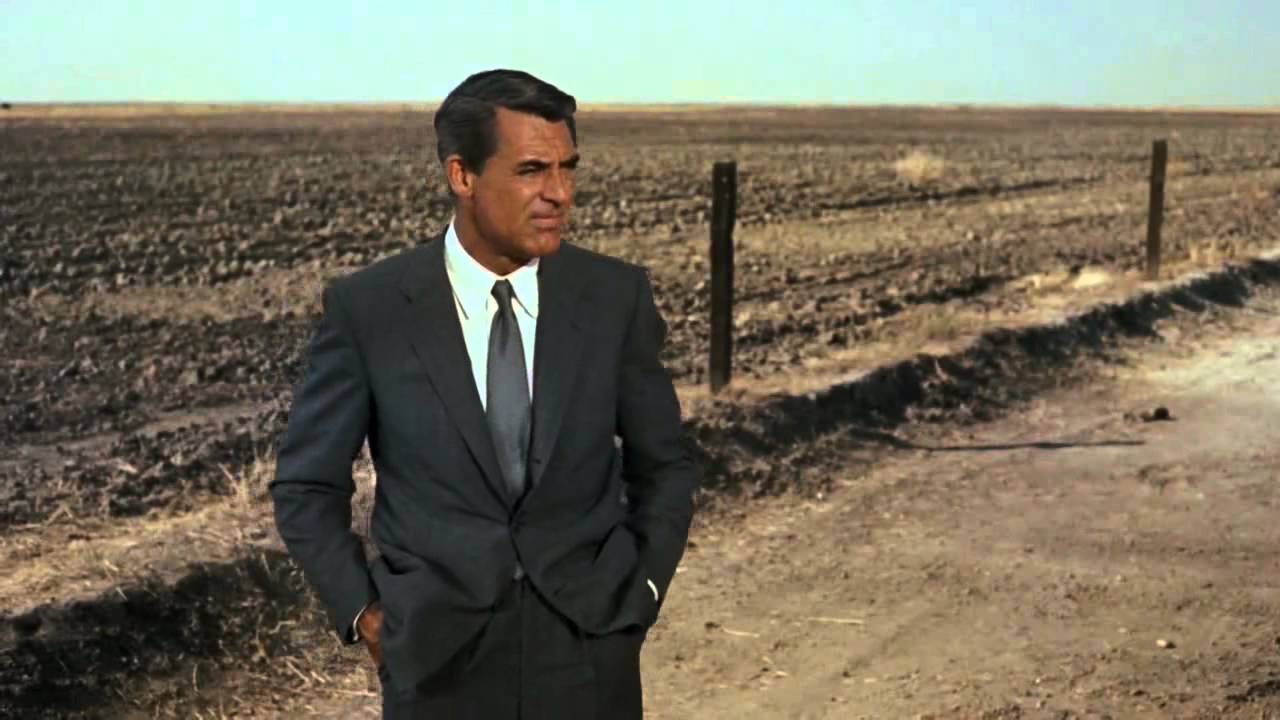
There have, of course, been many books, articles and academic theses written about the films of the great director, Alfred Hitchcock.
Some of these publications, such as Hitchcock’s Films Revisited (Robin Wood), The Art of Alfred Hitchcock (Donald Spoto), and A Long Hard Look at Psycho (Raymond Durgnat), have become reference guides, providing fascinating insights into the director’s unique approach to filmmaking, such as using the camera’s lens to tell the story rather than the actors’ countenances (many of the actors in his films have complained that they were rarely, if ever, coached by the director during filming).
However, two, both written by Donald Spoto: The Dark Side of Genius: The Life of Alfred Hitchcock, and Spellbound By Beauty: Alfred Hitchcock and His Leading Ladies, offer unique insights into Hitchcock’s character, describing a lonely and frustrated creative genius whose films were in some respects personal wish fulfillments.
Actors, in particular Cary Grant and James Stewart, performed as stand-ins for the director himself, who on film interacted and made love to beautiful, elegant women, and performing in challenging situations with confidence and self-assuredness. Hitchcock, painfully aware of his lifelong obesity and his inability to control it, frequently used self-deprecating humor to others, and those few who were able to get close to him, described in as lonely and terribly self-loathing.
It is to our benefit that he was able to channel these feelings into his work and give the world films that entertain and are memorable on both an accessible, popular level and still rise to the level of Art.
Often though, this self-loathing manifested itself sometimes violently, as resentment toward the handsome actors and attractive and even beautiful actresses in his films.
Because of who he was, as someone who had both the ability to place his female actors in believable and entertaining situations, while on a personal level was inexperienced and hopelessly naive, even lacking basic knowledge that most 7th graders would know about the opposite sex, he had, since the beginning of his career, abused those with whom he worked, and who helped make many of his films memorable.
When he became aroused, either sexually or romantically, able to neither perform nor satisfy his longings, would mistreat his talent that today would be considered harassment and sexual abuse, and in several cases, stalking, and would be legally enforced with something akin to an order of restraint. He and his wife Alma, it was well-known, were celibate, and he would joke that during one of their infrequent moments of intimacy, “9 months later, my daughter popped out.”
Actresses were subject to base locker room humor, and the kinds of jokes heard on a schoolyard playground. On YouTube there is an example of humor that actually helped: a screen test with the actress Anny Ondra, where he speaks lewdly at the end of the test in order to get Ondra to relax. But they did not always go in this direction, and, further on in his career, the “innocent playing” caused great personal strife and even life-threatening injury (to be examined later during the discussion of The Birds).
Several actresses, after one film and despite their knowledge that working with Hitchcock could vastly help them with their careers, refused to work with him again. He could be vindictive, a cruel practical joker, and vengeful. At his worst, he was indifferent, creating on the film set anxiety in the performers, not knowing how they were doing and interpreting his silence as damning disapproval.
Beyond his personal desires, Hitchcock was a man with a vastly complicated and rich mind. He was raised Catholic, and after school went to work immediately in the film industry in England. He read constantly, became knowledgeable in many fields; the insights gained from reading and researching frequently informed the subject matter of many of his films.
This article is Part 1 of three parts about this incredibly gifted and troubled film director, and will present key scenes which will be interpreted based on what we know about Hitchcock. It is a general survey with key points from five of his films
1. North by Northwest (1959): Sex, The Wrong Man, Female Deceit, Mother, Homosexuality
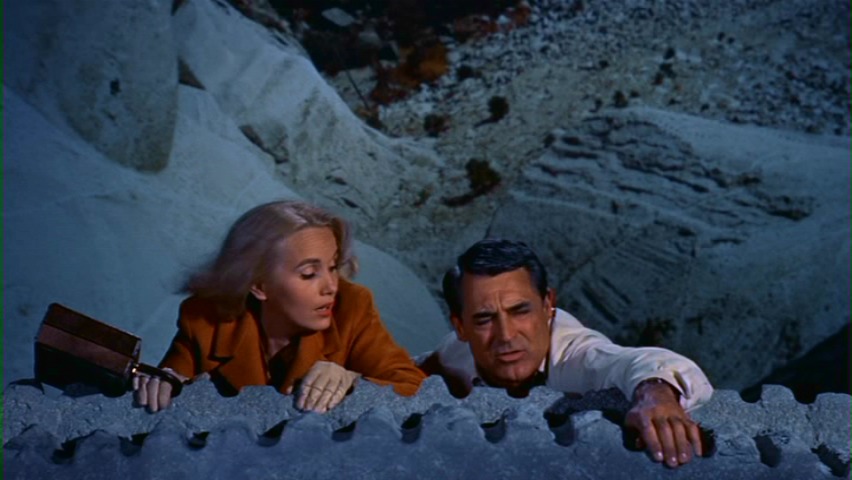
At the end of the film, the 20th Century limited passenger train careens through a tunnel, right after Roger Thornhill (Cary Grant) pulls Eve Kendall (Eva Marie-Saint) up to the top bunk to join him in what we can only conclude from train-and-tunnel imagery, as sexual intercourse. This image, copied hundreds of times since, is humorous, a tongue-in-cheek, an elbow in the ribs to a fellow viewer and saying, “Hey, buddy, you get it, Ha Ha!”
Yet Kendall, the woman with whom Thornhill will presumably be engaging in intercourse, not only deceived Thornhill earlier in the film, but on two occasions almost got him killed.
In the film, Roger Thornhill is the accused, the wrong man, mistaken to be government agent George Kaplan ( who himself doesn’t exist), by Phillip VanDamm, and his assistant and co-conspirator Leonard (Martin Landau), in the study of the Long Island estate of Lester Townsend, VanDamm, who grows increasingly bored of Thornhill’s “subterfuge” while denying he is Kaplan, asks Leonard, “Ah, Leonard, have you met our distinguished guest?”
Leonard, in a carefully directed shot gleefully set up by Hitchcock, sizes up Thornhill from head to toe, replies, “He’s a well-tailored one, isn’t he?” Clearly here, the cameras informs us of Leonard’s attraction to Kaplan/Thornhill. Later in the film, Leonard imparts to VanDamm his suspicion that Eve is a government agent, appealing to VanDamm to trust his (Leonard’s) “women’s intuition.”
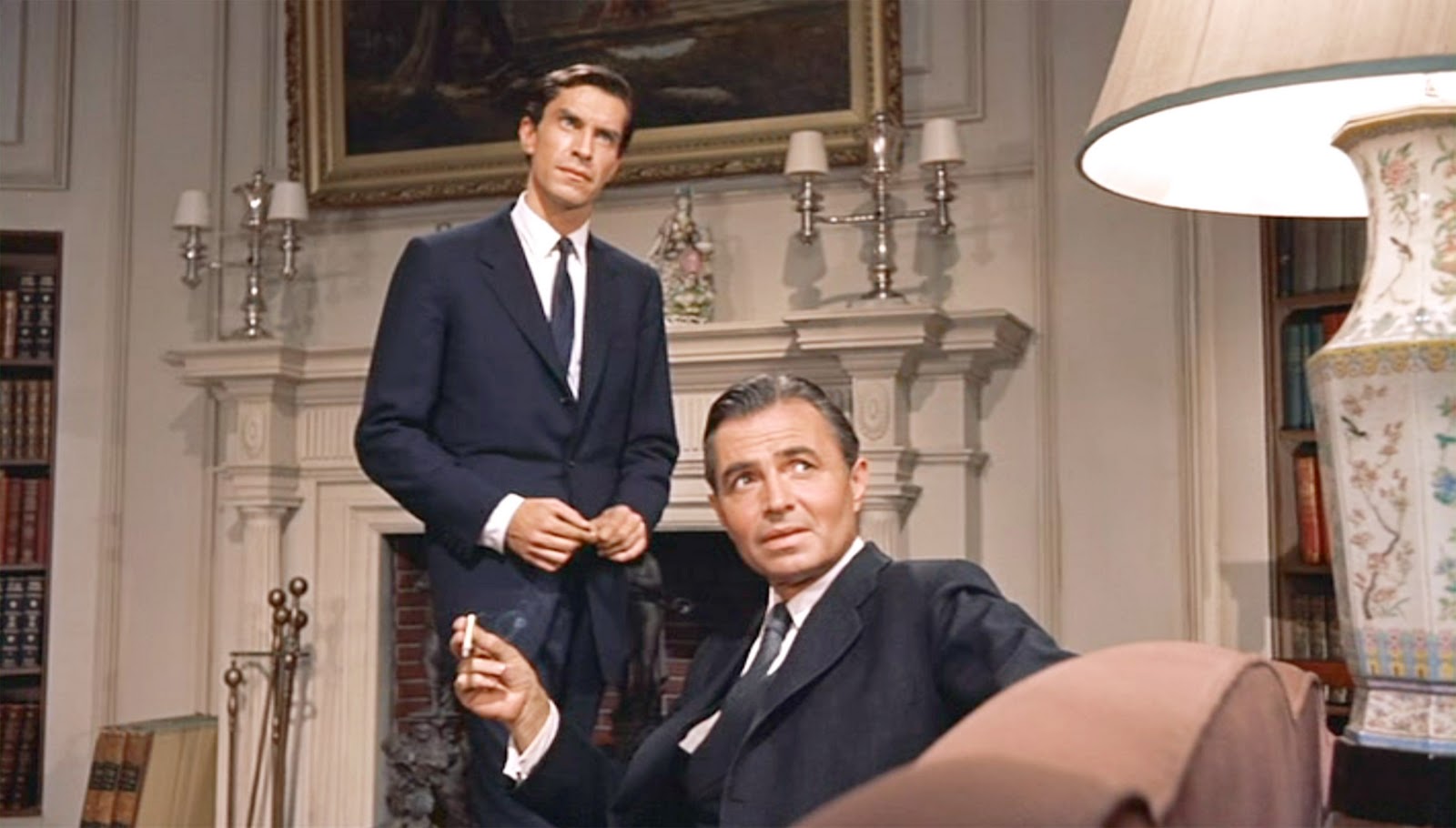
It was understood by his biographers, that Hitchcock felt extremely comfortable working with gay actors, and in fact used them in many of his films (Rope, Strangers on a Train, Rear Window, Psycho, I Confess, Rebecca). However, from his point of view, in this and in many other topics of a sexual nature, he was hopelessly naive and one-dimensional. As other films in this article are explored, this point will be articulated further.
When Thornhill is arrested for drunk driving after being forced to consume a bottle of bourbon at the Townsend estate, he makes his one phone call – to his mother. With a policeman sitting near him and dialing the number for him (Thornhill himself too inebriated to dial the number), like a guilty child, tries to convince his mother that he was not drinking. Yet a moment later, when being examined by the doctor to see if he is actually drunk, he confesses to the doctor that he is totally “gassed.”
It is fascinating, and very funny, fact that a responsible ad executive, obviously successful and independent, is reluctant to confess to his mother that he was drunk (as we know his inebriation not even his own doing). Such odd situations seem to occur in many of Hitchcock movies, and historians and researchers have agreed that these lines were put into the script by the director himself.
2. Notorious: (1946) Mother, Sex
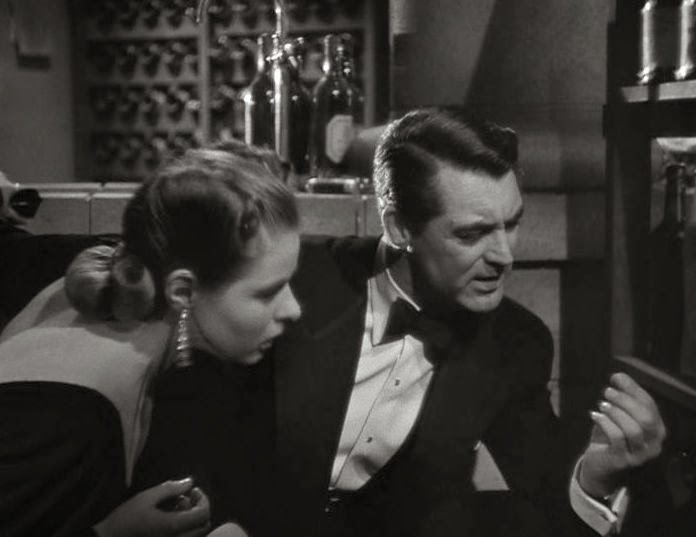
Alfred Hitchcock, when becoming comfortable with an writer or an actor, would partner with them for a series of films. Writers such as John Michael Hayes (four films) and Charles Bennett (five films), contributed a great deal, as well as actors Ingrid Bergman (3), Grace Kelly (3), Tippi Hedren (3) and Leo G. Carroll (4).
Of the male actors, though several others have appeared on multiple occasions, two stand out as having appeared in the director’s most important and most personal films: Cary Grant and James Stewart. Grant and Stewart appeared in four films apiece.
For Hitchcock, himself inexperienced in romance, filmmaking was an outlet for his innermost desires. His idea of the perfect woman was one whose hair was blonde, who dressed elegantly, was well-mannered and virtuous. But she must also have another dimension: she must be sleazy when the situation required. Being principled and pure was one side of the coin; willingness and an “anything goes attitude to satisfy my man” was the other.
Paul Verhoeven, for whom Hitchcock was a great influence, showed that Quaid chose for his ideal woman in Total Recall, one that was a combination of “sleazy” and “demure.” The women in his films became involved with Grant and Stewart, men who were opposite sides of the same coin – each representing different aspects of Hitchcock’s own makeup.
James Stewart, in the director’s mind and in his films, was a manifestation of the man that Hitchcock was: highly flawed, romantic, and most telling, lonely. It is not easy to forget the desperation conveyed by Stewart about Carlotta Valdes. He tries to “re-create” Judy Barton (both characters played brilliantly and understandingly by Kim Novak, not the director’s original choice for the part).
It is well-known how Hitchcock, in securing one of his “ideal” actresses, would make them over, usually beyond the point of obsession, making demands on these women that would most likely be considered stalking or even criminal abuse today (more on this in an upcoming article).
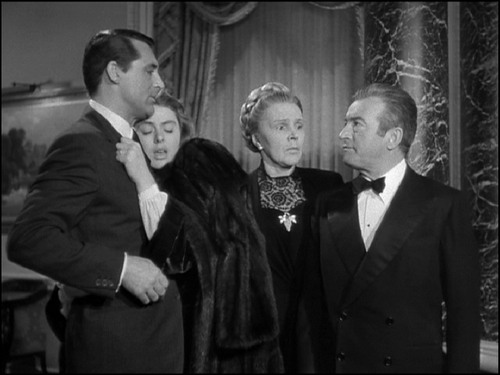
For the director, Cary Grant represented the other side of the coin, the man who Hitchcock wished himself to be. Grant is poised, self-possessed, highly confident with women, and sophisticated in each of the four films in which he performed.
Grant in Hitchcock’s movies, represented an unattainable ideal, and it is (perhaps sadly) to our benefit as lovers of film, that Hitchcock, who was reportedly celibate most of his life, could only lived the life he genuinely wished for in his heart, only through his brilliant and wonderful films.
But in Notorious, the focus for our purposes is Claude Rains, and his mother, played by Leopoldine Konstantin. Konstantin, known through her short film career as a kind, reserved, even shy woman, was rousing in Notorious, making each scene she was in memorable for her portrayal of Sebastian’s (Rains), dominant and intelligently calculating mother.
The character of Sebastian in Notorious is portrayed by Rains as lacking in confidence, non-assertive, effeminate, and envious of Devlin (Grant). Devlin, a government agent, is described by Alicia Huberman (Ingrid Bergman) as a former boyfriend who is forlorn and unhappy about their recent breakup.
However, whenever Sebastian has the occasion to see Devlin, he is intimidated by his “good looks”. He constantly inquires of Alicia whether she still has feelings for him. In order to assist the U.S. Government, Alicia has agreed to marry Sebastian in order to gather information about his group’s Nazi plots (the espionage involvement by Alicia and Devlin is one of Hitchcock’s “MacGuffins”: A plot device that has no real meaning nor interest for the audience and only serves to move the romantic story of the main protagonists forward).
Thus, in Notorious, Bergman qualifies as one of Hitchcock’s ideal woman: someone who is sleazy/demure, who is elegant and refined, but who will sleep with (and have sex with) Sebastian (a man she does not love).